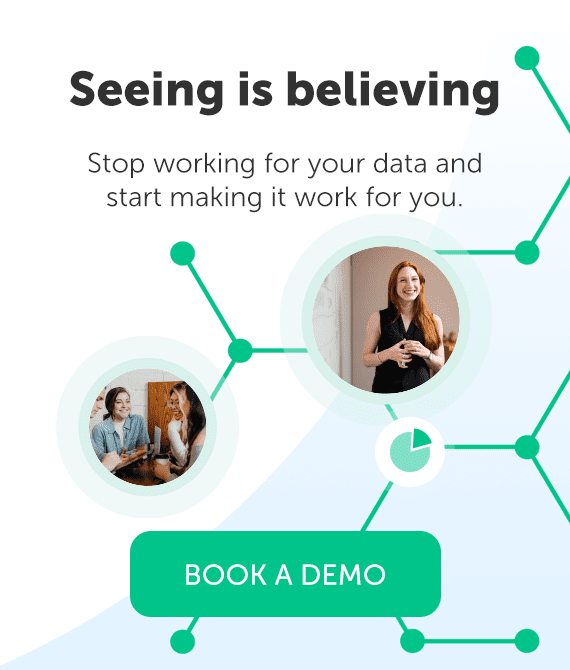Ask any successful business professional what it takes to build a sustainable business, and they will tell you the key is cultivating and developing relationships with potential and existing clients. With so much riding on the relationship intelligence between businesses and their prospects and clients, it makes perfect sense that so many organizations have adopted Customer Relationship Management (CRM) software. But CRM on its own does not fuel the interactions that take relationships to new levels and make them pay off.
Why CRM falls short
CRM works perfectly well for the task it was designed to handle: managing a company’s interactions with current and potential customers. But simply managing interactions does not add value to either the company or its prospects and customers. Sales and business development professionals are craving insights that reveal opportunities to save time or generate more revenue. In other words, they want to call upon the data at their disposal to offer true value to prospects and customers in the form of strategic guidance and advice.
While it’s true that the data captured in a CRM system can lead to valuable insights, it can only do so when it’s complete and contextual. Unfortunately, the bane of many CRM system managers’ existence is trying to get users to enter data about their contacts and accounts. In many organizations, CRM systems contain a mix of robust and neglected records. Simply put, some records provide little beyond contact information – despite the fact that it’s now possible to access significant information online about contacts and accounts. Pair this with the sometimes Herculean effort needed to access critical information in these systems, and it’s easy to see why so many organizations are disappointed in the return on their CRM investments.
Enter relationship intelligence automation
Relationship intelligence automation (RIA) was developed to address these critical shortcomings. Essentially, it helps fill the gaps in CRM systems while also empowering companies to make sense of and act on all the data they’ve collected.
First, RIA automatically collects and enters critical data about prospects and customers – including that related to transactions, social media, and online activities – into CRM systems. In fact, RIA gathers this information from far more sources than most employees typically do or can. It even gathers data about the interactions that take place between the prospective or existing client and all areas of the business (such as in customer service, purchasing, etc.).
Most employees lack access or the time to gather this far-reaching data, living in both internal and external sources. However, RIA was built to excel at this task. As a result, it lays the foundation for a comprehensive understanding of each account and contact.
Second, RIA serves up relevant contact and account information with the click of a button, vastly simplifying the process of preparing for a meeting. Rather than spend their time pulling information from the CRM system, sales and business development professionals can focus on how to present the actionable insights delivered to them via RIA. This is crucial as more than 90% of workers recently surveyed said automation solutions increased their productivity, and 85% said these tools boosted collaboration across their teams.
Third, RIA even warns organizations when client relationships are at risk. For instance, perhaps an existing client has not recently used a service under contract and the account’s main contact (the original champion) hasn’t responded to requests to renew the contract. Meanwhile, another contact from the client’s organization has been engaging in discussions online about services from other vendors. RIA can gather this information, map the relationships to the account, and make all the connections to spot potential problems (something a CRM system cannot do). By acting on this insight, the organization can take proactive steps to try to save the business.
In essence, RIA gives sales and business development professionals the right information at the right time in the right channel while guiding them to use it in the right and best way possible.
Why relationship intelligence automation matters
Most businesses today are finding themselves challenged by prospective and existing clients to deliver new levels of service and value. With so much commodity in the marketplace of products and services, customers can afford to be highly selective of their vendors. Knowing they hold so much power, many of them are demanding more from both existing and potential business partners. Rather than just purchase a product or service, they want to develop relationships with companies that can strategically guide them to drive more value from their own businesses.
This shift is forcing companies to spend less time on mundane admin work and more on strategic brainstorming and planning. By calling upon relationship intelligence automation, they free themselves of meaningless tasks while gaining access to new data-driven insights. In turn, they can focus more time on identifying and seizing interaction opportunities, building stronger relationships, and driving more client business.
Ready to take customer relationships to new levels? Learn more about how to automate and enhance your customer relationship management with a personalized demo of relationship intelligence automation.
FAQ on relationship intelligence
What is relationship intelligence?
Relationship intelligence refers to the strategic use of data and analytics to understand and enhance the interactions between a business and its clients. It involves gathering insights from communication patterns, client behavior, connections, and networking trends to optimize relationship management and improve business outcomes.
Why is relationship intelligence critical to success?
Relationship intelligence is critical because it enables businesses to build deeper, more meaningful connections with clients and prospects. By leveraging detailed insights about these relationships, companies can tailor their communication strategies, predict client needs, and offer more personalized services, thereby increasing loyalty, satisfaction, and overall business growth.
Where does relationship intelligence come from?
Relationship intelligence is derived from a variety of sources including CRM systems, email exchanges, social media interactions, and business networking platforms. Advanced analytics and machine learning algorithms process this data to extract valuable patterns and insights, which businesses can then use to strengthen their client relationships and enhance their strategic decision-making.
Award-winning software










